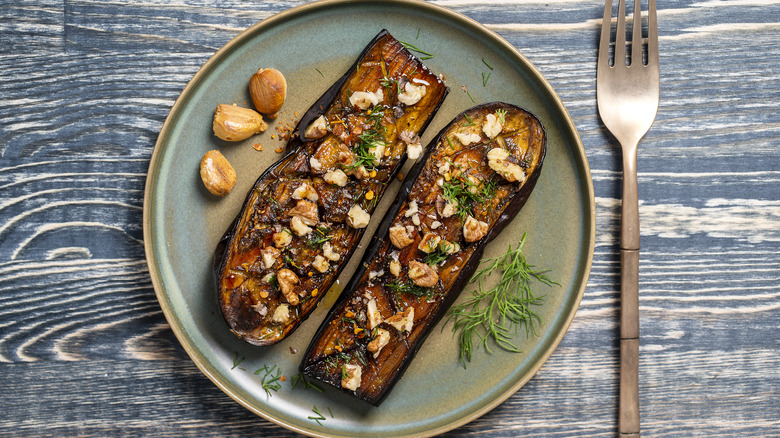Daniel Boulud's Tip For Prepping Crispier Eggplant
Eggplant season is near, and sooner than later, your local grocery store's shelves and weekend farmers' market stands will be stocked with more of them than anyone knows what to do with. It doesn't matter if they're the Chinese variety, the Thai, or the Italian — all eggplants act like sponges in the skillet, and no matter how much oil you use, they'll absorb it right up. This can be quite the conundrum for any newcomers to the fruit (yes, eggplants are fruits), and that's especially so if you're hoping to get them good and crispy. But the secret to that is all in how you prep them.
French chef and New York City restauranteur Daniel Boulud claims that you need two things to get crispier eggplant: salt and time. Rather than drenching your eggplant in oil while it's in the pan, he recommends thinking ahead of the game — about half an hour ahead, to be exact. As he demonstrated on "Today," your chopped eggplant should get a nice sprinkle of salt 20 to 30 minutes before going into the oven or skillet. The time allows the salt to draw the water out of the fruit in a process known as osmosis. In turn, the eggplant comes out crispy and golden.
Crispy eggplant
There's really not much else to it — simply cut your eggplant in whatever way you like, sprinkle the flesh with whatever variety of salt you have on hand, and watch it sweat. That's right, the salt draws the moisture out of the fruit and literally makes it sweat. So, when you come back to your eggplants, you'll actually be able to see droplets of water on them. Then, you can just give them all a little pat with a paper towel before tossing them in cooking oil and baking or pan-frying them. While it may take some extra time, you'll come to see that the results are well worth it.
From your eggplant parm to your Mediterranean-baked stuffed eggplant, taking the time to salt your eggplant prior to cooking is a simple way to incorporate sweeter flavors and more dynamic textures into all of your go-to eggplant dishes. As the water evaporates from the fruit, so does any bitterness. Then, the resulting texture will maintain the soft, somewhat meaty mouthfeel of the eggplant's flesh but with a crispy exterior and skin that comes through in each bite. You can use it to make a vegetarian eggplant pate, as Daniel Boulud did, or elevate any of your favorite eggplant recipes.

